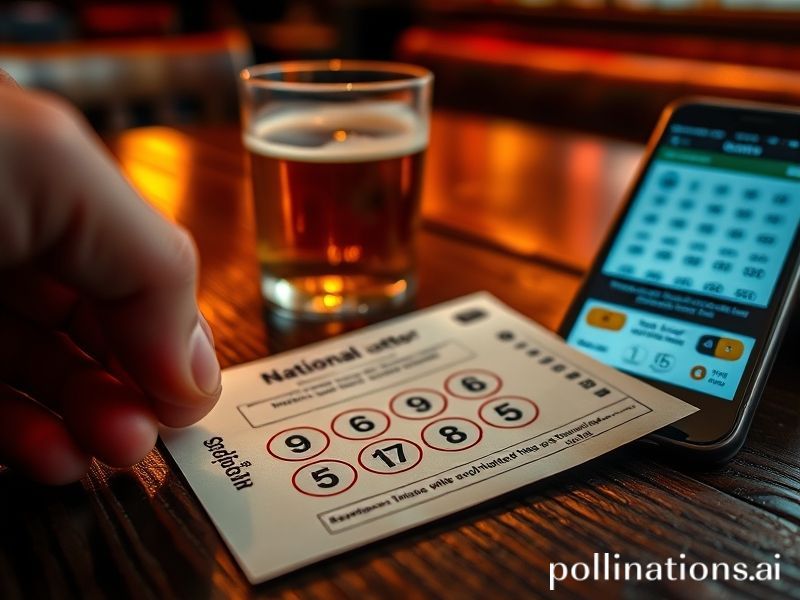Global Lottery Fever: How One Set of Numbers Unites, Divides, and Mildly Irritates the Planet
Global Lottery Numbers Drop Like Guilt at 3 a.m.—and the World Pretends It’s Hope
By the time the last ball clacked into its acrylic cage on Wednesday night, the “national lottery lotto results” had already ricocheted through six continents, three tax shelters, and one WhatsApp group containing your cousin in Lagos who swears he “had a dream about 14.” From Reykjavík to Riyadh, people stared at the same string of digits—3, 9, 14, 27, 33, 42—as though they were coordinates to El Dorado rather than a statistical taunt dressed up in primary colors. The jackpot: a cool £184 million, or, if you prefer your despair in dollars, roughly the cost of replacing every missing submarine this year.
Of course, calling it a “national” lottery is charmingly parochial. Camelot may run the draw from a secure studio somewhere in the damp English Midlands, but half the tickets were bought on apps domiciled in Gibraltar, processed through servers in Malta, and paid for with cards issued in jurisdictions so discreet they don’t even have weather. The winner, if human, will likely be a multinational entity unto themselves—part tax resident, part ghost, part shell company named after a cat. The rest of us, meanwhile, remain proudly sovereign in our losing.
Over in Spain, La Primitiva sulked like an aging flamenco dancer whose hip just gave out. Across the Atlantic, Powerball executives watched the frenzy with the detached curiosity of arms dealers observing someone else’s war. They know the real product isn’t the money—it’s the 90-second dopamine drip between seeing the numbers and realizing your rent is still due. As a behavioral economist in Singapore told me, “State lotteries are the only export where the customer voluntarily pays 200% tariff on hope.” He was drinking a S$19 kale smoothie at the time, so his credibility was mathematically bulletproof.
The geopolitical angle is equally droll. Emerging-market governments eye these weekly circuses the way a kleptocrat eyes a development grant: with envy and Excel spreadsheets. Kenya just floated a Eurobond at 10.37%, but the Treasury would save basis points by simply rebranding matatu tickets as scratch cards. Brazil’s finance minister was overheard muttering that if Brazilians spent half as much on domestic bonds as they do on Mega-Sena, the real might finally stop behaving like a cryptocurrency on a juice cleanse.
Meanwhile, humanitarian agencies do the moral math. Oxfam calculates that every pound blown on lotto lines could deworm 3.7 children, but that presumes children are as exciting as a yacht you’ll never buy. In the Za’atari refugee camp, Syrian teenagers trade screenshots of the results like contraband memes; the jackpot is a number so large it compresses the Mediterranean into a puddle they might someday afford to cross properly. Irony, ever the seasoned traveler, notes that the same telecom infrastructure delivering their results was probably subsidized by lottery taxes in the first place.
Back home, the British press performed its ritual striptease: first the human-interest angle (mum-of-four from Hull plans to keep working at Greggs), then the inevitable think-piece asking whether lotteries prey on the poor. Spoiler: they do. The same edition carries adverts for premium bonds, crypto ETFs, and a payday-loan startup whose APR is best expressed in scientific notation. Somewhere, a sociology professor updates a lecture titled “Late-Stage Capitalism’s Greatest Hits,” files it under “voluntary taxation,” and schedules a conference in the Caymans—expenses TBD.
Yet for all the cynicism, the numbers still glow like runway lights for the desperate. In Warsaw, a pensioner prints the results on thermal paper that will outlast her. In Manila, a call-center agent circles 42 on a napkin, reasoning it’s “the answer to everything.” In Montreal, an AI startup scrapes the draw to train a model that predicts regret. All are participants in the same planetary pastime: converting future disappointment into tonight’s tolerable fiction.
The draw ends, the websites update, and the world shrugs back into its perpetual Tuesday. Somewhere, a push notification gently lies: “It could be you.” Statistically, it won’t be. But hope, unlike money, enjoys unlimited quantitative easing, and the house always breaks even on delusion.







